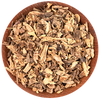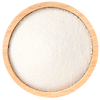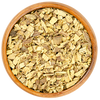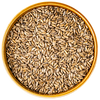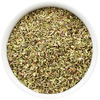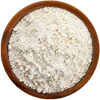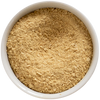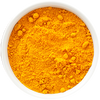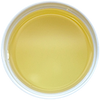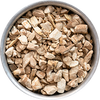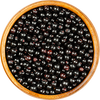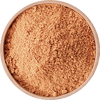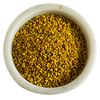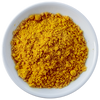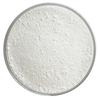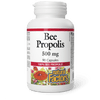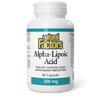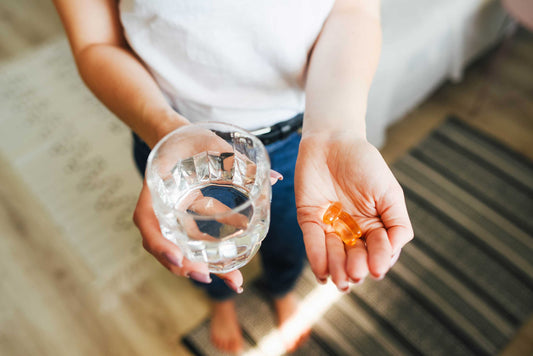
With so much circulating information about collagen, you’ve probably wondered if you should be taking a collagen supplement. Are its touted benefits for wrinkles and smoother skin true? Does taking collagen really help strengthen bones and reduce joint pain? Let’s uncover everything you need to know about this popular protein.
Collagen 101
Collagen is the main structural protein found throughout the body. Often described as the “glue” that holds the body together, collagen provides strength and support to our connective tissue. [1] Collagen is made up of three chains of specific amino acids that form a triple helix and make up 25–35% of our total body protein. This abundant protein is commonly found in: [2]
- Skin
- Tendons
- Ligaments
- Cartilage
- Bones
- Blood vessels
There are currently 28 different types of collagen that have been identified in the body. Although there are five main types, type I accounts for 90% of the body’s collagen and can be found in the skin, cornea, blood vessels, bones, ligaments, and tendons. Type II is found in the cartilage and intervertebral discs, and type III is located in the skin and blood vessels. [2–4] These are the three collagen types commonly found in collagen supplements.
Unfortunately, the activity of our collagen-producing cells (called fibroblasts) starts to decline after the age of 30. Although our bodies continue to make collagen throughout life, it’s estimated that collagen production declines approximately 1.0–1.5% per year. [5] Collagen breakdown also occurs more quickly. Fine lines and deep wrinkles are a familiar outcome to many, but that’s not all that can happen. Collagen loss can also result in joint concerns, thinning bones, brittle nails, and hair loss. Other factors can accelerate collagen loss as we age, such as: [5,6]
- Smoking
- Poor nutrition
- Sun and pollution exposure
- Stress
- Genetics
- Loss of estrogen during menopause
Supporting collagen production is crucial in maintaining healthy skin, hair, nails, joints, and bones. From adopting healthy dietary and lifestyle approaches to taking specific supplements, there are many valuable solutions to help overcome the impact of collagen loss. One strategy that has gained much attention and popularity is using collagen supplements.
About Collagen Supplements
If you have ever shopped for a collagen supplement, you know first-hand that there is an overwhelming number of available choices.

Buyer beware! Not all collagen supplements are the same; they come in various forms and qualities. Consider these key facts for selecting a clean and supportive collagen supplement:
- Look for hydrolyzed collagen supplements. Collagen needs to be broken down so the body can use it. Hydrolyzed collagen has been broken down into smaller collagen peptides or small amino acid chains by a process called hydrolysis. In addition to being highly digestible and easily absorbed by the body, hydrolyzed collagen provides many advantages, such as being odourless and colourless. [7,8] This makes using hydrolyzed collagen very easy – it can simply be mixed into different foods and liquids (hot or cold!). After collagen peptides are consumed, they make their way throughout the body, acting as building blocks for collagen and elastin production. Collagen peptides can also stimulate fibroblasts to produce collagen and elastin and replace what has been lost because of aging and other factors. [7]
- Choose collagen supplements sourced from reputable bovine and marine sources. Collagen can only come from animal sources such as the skin, bones, and cartilage of cows, fish, chickens, and/or pigs. For your personal health and the health of the planet, it is important to choose reputable sources such as pasture-raised, grass-fed cattle and wild-caught fish. Pasture-raised and grass-fed cattle have been humanely nurtured in a natural environment and allowed to eat grass grown on the pasture. Similarly, wild-caught fish live in a habitat where they can naturally feed on what is available in their environment, ensuring a natural and sustainable fish source.
- Pick collagen supplements that undergo third-party testing. All supplements, including collagen, can contain potential allergens, pesticides, solvents, GMOs, heavy metals, microbes, and pharmaceutical agents. When picking a collagen supplement, it is important to choose one that has undergone third-party testing to ensure the product is non-GMO, pure, potent, and accurately labeled.
Benefits of Hydrolyzed Collagen

Taking a hydrolyzed collagen supplement can offer numerous health benefits. Research has shown hydrolyzed collagen helps:
- Improve skin hydration and elasticity [9,10]
- Reduce the depth of wrinkles and fine lines [10,11]
- Reduce eye wrinkles within four weeks [11]
- Reduce joint pain associated with osteoarthritis [12]
- Reduce the appearance of cellulite [13]
- Strengthen nails and increase nail growth [12]
- Strengthen bone density [14]
- Support healthy joints by maintaining healthy cartilage [15]
- Improve joint pain in college athletes [16]
- Improves body composition in combination with resistance training [17]
If you are looking to support the health of your hair, skin, nails, bones, and joints, and are concerned about the impact of collagen loss with age, a hydrolyzed collagen supplement may be right for you. Collagen supplements are available in various forms, such as powders and tablets. Collagen powders can be easily incorporated into hot and cold beverages (including your morning coffee!) different foods without affecting the flavour. Although research suggests, a safe and effective hydrolyzed collagen dosage is 2.5–15g per day, benefits for skin, nails, joints, and bones are often seen with 2.5–5 g per day. [18]
Continue your journey toward supporting collagen production with additional dietary and lifestyle changes, including:
- Eat protein-rich foods, such as chicken, fish, eggs, and beans
- Consume bone broth regularly
- Eat vitamin C-rich foods, such as citrus, berries, and cruciferous vegetables
- Protect your skin from sun exposure
- Wear sunglasses
- Quit smoking
- Manage stress
- Engage in physical activity

 Health Essentials
Health Essentials
 Brain & Cognitive Health
Brain & Cognitive Health
 Bladder & Urinary Support
Bladder & Urinary Support
 Eye & Vision
Eye & Vision
 Energy & Healthy Aging
Energy & Healthy Aging
 Heart & Circulatory Health
Heart & Circulatory Health
 Healthy Hormone Balance
Healthy Hormone Balance
 Respiratory Health
Respiratory Health
 Bone Health
Bone Health
 Weight Management
Weight Management
 Joint Health
Joint Health
 Sport Nutrition
Sport Nutrition
 Digestive & Intestinal Health
Digestive & Intestinal Health
 Detox & Cleanse
Detox & Cleanse
 Immune Support
Immune Support
 Sleep & Stress Solutions
Sleep & Stress Solutions









